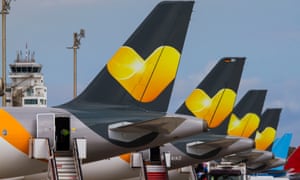Thomas Cook shares plunge amid fears over £389m debt mountain
Travel firm’s bosses try to reassure investors as its value slips below the size of its debt
Thomas Cook shares tumbled further on Tuesday and the cost of insuring debt issued by the travel firm against default hit a record high, despite its efforts to reassure investors over its worsening performance and £389m debt mountain.
The shares tumbled by as much as 13% to a six-year low of 21p, before closing at 23p, down nearly 4%. Shares have lost more than half of their value over the past week, after Thomas Cook issued its second profit warning in two months.
The slump in the share price has slashed the firm’s market value to about £348m, from £2.2bn in May. This means it is worth less than the size of its debt. The price of its 2022 euro-denominated bonds tumbled more than 11 cents to a record low of 71.371 cents.
Thomas Cook’s chief executive, Peter Fankhauser, and its interim chief financial officer, Sten Daugaard, are this week meeting investors worried about the firm’s financial strength and strategy.
Their concerns were exacerbated when the firm gave a less detailed outlook for next year than in the past, adding to fears over the impact of Brexit or another crisis in an important package holiday destination such as Turkey.
The 177-year-old travel company scrapped its dividend last week in an effort to retain cash and blamed a disappointing year on the prolonged summer heatwave across Europe, which meant people delayed their bookings, especially in the UK, and travel firms had to discount their packages heavily in the late booking market.
However, investors also suspect the firm overbooked hotel room capacity, particularly in highly competitive Spanish destinations, forcing it to discount heavily as the market softened.
The firm’s net debt has risen to £389m, partly due to delayed bookings. This was far higher than the City had expected, and more than double guidance at the middle of the financial year, according to analysts at CreditSights, a debt research firm.
Rather than eliminating debt by 2020 as forecast by analysts, the group is looking to reduce debt by 2022 when its bank covenants expire. The increase in borrowing costs on bond markets in the aftermath of the results statement could cause the company liquidity problems in the future.
Stuart Gordon, an analyst at Berenberg Bank, warned that another fundraising round was likely to be necessary. But the firm insisted its lenders were supportive and said it had secured additional flexibility.
Analysts fear the firm is facing structural challenges – beyond the one-off problems caused by the unusually hot summer – that will require significant changes to operations, including the likelihood of further closures in its large branch network and increased spending on online sales, where it is losing market share.
“We are booking [holidays] online, and Thomas Cook has a very extensive store portfolio,” said Gordon. “I think they’ve hidden behind the hot summer.”
During the last financial year the firm closed 100 stores it said were loss-making. It says it has no plans for more closures or job losses, but it intends to add more in-store foreign exchange staff to boost branch profitability.
However, Gordon said the company must cut costs of about £100m a year as it adjusts to the shift in customers’ buying habits.
Thomas Cook previously faced similar doubts about its survival in 2012, when it was forced to dispose of hotels and part of its airline in order to raise money. The company carried out a rights issue in 2013 in an attempt to shore up its balance sheet.
The latest worries around the company’s financial performance could feed back into weaker demand from customers as the travel agent approaches the crucial post-Christmas period, when many people book their summer holidays.
Helal Miah, an analyst at the Share Centre, a stockbroker, said: “This whole situation at the moment adds reputational damage. This is not going to help them in the short term.”
Since you're here…
… we have a small favour to ask. Three years ago we set out to make The Guardian sustainable by deepening our relationship with our readers. The same technologies that connected us with a global audience had also shifted advertising revenues away from news publishers. We decided to seek an approach that would allow us to keep our journalism open and accessible to everyone, regardless of where they live or what they can afford.
More than one million readers have now supported our independent, investigative journalism through contributions, membership or subscriptions, which has played such an important part in helping The Guardian overcome a perilous financial situation globally. We want to thank you for all of your support. But we have to maintain and build on that support for every year to come.
Sustained support from our readers enables us to continue pursuing difficult stories in challenging times of political upheaval, when factual reporting has never been more critical. The Guardian is editorially independent – our journalism is free from commercial bias and not influenced by billionaire owners, politicians or shareholders. No one edits our editor. No one steers our opinion. This is important because it enables us to give a voice to those less heard, challenge the powerful and hold them to account. Readers’ support means we can continue bringing The Guardian’s independent journalism to the world.
If everyone who reads our reporting, who likes it, helps to support it, our future would be much more secure. For as little as £1, you can support the Guardian – and it only takes a minute. Thank you.


No comments:
Post a Comment